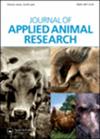越南顺化天然大理石纹鳗鱼的部分生物成分
IF 1.9
4区 农林科学
Q3 AGRICULTURE, DAIRY & ANIMAL SCIENCE
引用次数: 0
摘要
本文章由计算机程序翻译,如有差异,请以英文原文为准。
Some biological components in natural marbled eel in Thua Thien Hue, Vietnam
ABSTRACT A species of catfish belonging to the Anguilla genus called Anguilla marmorata has long been exploited and grown in Vietnam. Marbled eels are regarded as a specialty seafood species with several therapeutic and nutritive benefits. This study used High-Performance Liquid Chromatography (HPLC) to identify various biochemical and nutritional ingredients in A. marmorata collected in its natural habitat. There was 16 different amino acids analysed in the muscle, skin, and mucus of marbled eels at the rates of 14.01%, 5.48%, and 9.96%, respectively. Twenty-four fatty acids were found in muscle and skin, while only nine fatty acids were detected in the mucus with proportions of 11.93, 25.91, and 0.37 g/100 g, respectively. Six different vitamins (A, B3, B5, D3, C, E) are found in the muscle of the eel; five types of vitamins (A, B3, B5, D3, E) were detected in the skin; and three vitamins (B3, B5, C) are found in mucus. Using HPLC analysis has shown remarkable effectiveness in micronutrient analysis in nutritional research. The results will increase our knowledge of the nutritive benefits of the A. marmorata and point the way toward the creation of functional foods and cosmetics with natural ingredients that may be used on people.
求助全文
通过发布文献求助,成功后即可免费获取论文全文。
去求助
来源期刊

Journal of Applied Animal Research
农林科学-奶制品与动物科学
CiteScore
2.70
自引率
0.00%
发文量
80
审稿时长
6 months
期刊介绍:
Journal of Applied Animal Research (JAAR) is an international open access journal. JAAR publishes articles related to animal production and fundamental aspects of genetics, nutrition, physiology, reproduction, immunology, pathology and animal products. Papers on cows and dairy cattle, small ruminants, horses, pigs and companion animals are very welcome, as well as research involving other farm animals, aquatic and wildlife species. In addition, manuscripts involving research in other species that is directly related to animal production will be considered for publication.
 求助内容:
求助内容: 应助结果提醒方式:
应助结果提醒方式:


